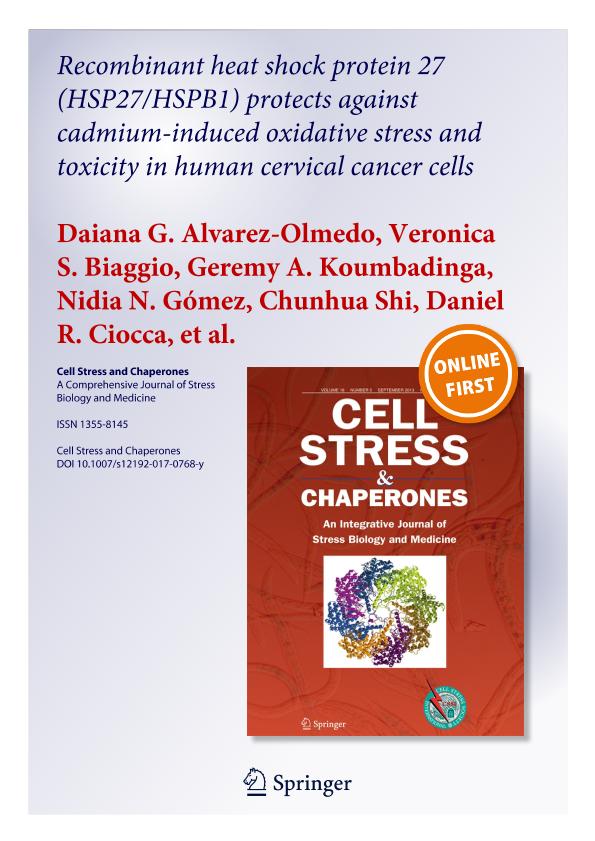Artículo
Recombinant heat shock protein 27 (HSP27/HSPB1) protects against cadmium-induced oxidative stress and toxicity in human cervical cancer cells
Alvarez Olmedo, Daiana Gisela ; Biaggio, Veronica Silvina
; Biaggio, Veronica Silvina ; Koumbadinga, Geremy A.; Gomez, Nidia Noemí; Shi, Chunhua; Ciocca, Daniel Ramon
; Koumbadinga, Geremy A.; Gomez, Nidia Noemí; Shi, Chunhua; Ciocca, Daniel Ramon ; Batulan, Zarah; Fanelli, Mariel Andrea
; Batulan, Zarah; Fanelli, Mariel Andrea ; O´Brien, Edward R.
; O´Brien, Edward R.
 ; Biaggio, Veronica Silvina
; Biaggio, Veronica Silvina ; Koumbadinga, Geremy A.; Gomez, Nidia Noemí; Shi, Chunhua; Ciocca, Daniel Ramon
; Koumbadinga, Geremy A.; Gomez, Nidia Noemí; Shi, Chunhua; Ciocca, Daniel Ramon ; Batulan, Zarah; Fanelli, Mariel Andrea
; Batulan, Zarah; Fanelli, Mariel Andrea ; O´Brien, Edward R.
; O´Brien, Edward R.
Fecha de publicación:
05/2017
Editorial:
Springer
Revista:
Cell Stress & Chaperones
ISSN:
1355-8145
e-ISSN:
1466-1268
Idioma:
Inglés
Tipo de recurso:
Artículo publicado
Clasificación temática:
Resumen
Cadmium (Cd) is a carcinogen with several welldescribed toxicological effects in humans, but its molecular mechanisms are still not fully understood. Overexpression of heat shock protein 27 (HSP27/HSPB1)—a multifunctional protein chaperone—has been shown to protect cells from oxidative damage and apoptosis triggered by Cd exposure. The aims of this work were to investigate the potential use of extracellular recombinant HSP27 to prevent/counteract Cdinduced cellular toxicity and to evaluate if peroxynitrite was involved in the development of Cd-induced toxicity. Here, we report that the harmful effects of Cd correlatedwith changes in oxidative stress markers: upregulation of reactive oxygen species, reduction in nitric oxide (NO) bioavailability, increment in lipid peroxidation, peroxynitrite (PN), and protein nitration; intracellular HSP27 was reduced. Treatments with Cd (100 μM) for 24 h or with the peroxynitrite donor, SIN-1, decreased HSP27 levels (~50%), suggesting that PN formation is responsible for the reduction of HSP27. Pre-treatments of the cells either with Nω-nitro-L-arginine methyl ester hydrochloride (L-NAME) (a pharmacological inhibitor of NO synthase) or with recombinant HSP27 (rHSP27) attenuated the disruption of the cellular metabolism induced by Cd, increasing in a 55 and 52%, respectively, the cell viability measured by CCK-8. Cd induced necrotic cell death pathways, although apoptosis was also activated; pre-treatment with LNAME or rHSP27 mitigated cell death. Our findings show for the first time a direct relationship between Cd-induced toxicity and PN production and a role for rHSP27 as a potential therapeutic agent that may counteract Cd toxicity.
Archivos asociados
Licencia
Identificadores
Colecciones
Articulos(IMBECU)
Articulos de INST. DE MEDICINA Y BIO. EXP. DE CUYO
Articulos de INST. DE MEDICINA Y BIO. EXP. DE CUYO
Citación
Alvarez Olmedo, Daiana Gisela; Biaggio, Veronica Silvina; Koumbadinga, Geremy A.; Gomez, Nidia Noemí; Shi, Chunhua; et al.; Recombinant heat shock protein 27 (HSP27/HSPB1) protects against cadmium-induced oxidative stress and toxicity in human cervical cancer cells; Springer; Cell Stress & Chaperones; 22; 3; 5-2017; 357-369
Compartir
Altmétricas



